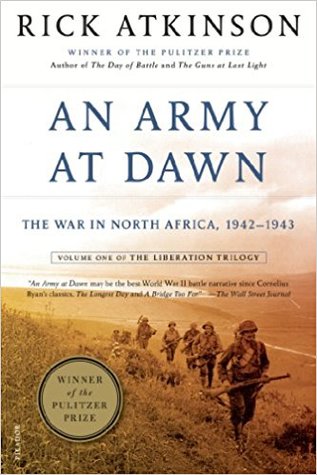More on this book
Community
Kindle Notes & Highlights
Some lessons were fundamental: stay low; take a few extra moments to study the map before setting off. But others involved the nature of combat and leadership: a realization that battlefields were inherently chaotic; that improvisation was a necessary virtue; that speed and stealth and firepower won small skirmishes as well as big battles; that every moment held risk and every man was mortal.
war was fought by ignorant armies on a darkling plain.
The deeper he gets into a fight, the more of a fighting man he becomes.
But, as one officer later observed, much of the American campaign in Tunisia involved “trying to draw a line between what we knew and what we did.”
J. C. Penney’s shelves were often barren, but customers wandered in anyway, as if shopping were an act of imagination rather than of commerce.
“I guess nations going to war must go through a stumbling period before they purge the incompetents,” he wrote: I think this is a five-year war. It won’t be over until another winter has passed, until we are firmly on the Continent, and until Germany is faced with still another winter…. Now we know too much. Now we know that the world we knew is a long time dead. We know there’ll be troubles of every sort.
After months of stress, of close calls, of witnessing the unspeakable, even the bravest men wondered, as one fighter squadron commander did, “Am I becoming uncourageous?” Modern combat could break any soldier.
A “good straightforward job” was now called for, and in this homely requisite the Americans found their genius. If the winter campaign in North Africa had revealed Eisenhower’s infirmities, just as it revealed those of his army, spring would elicit strengths of character and competence in both the man and the host he commanded. Eisenhower had been naive, sycophantic, unsure of his judgment, insufficiently vigorous, and a more titular than actual commander. The U.S. Army had been sloppy, undisciplined, cavalier, insufficiently vigorous, and a more titular than actual army. These traits did not
...more
Yet the army lumbered like “a dray horse on a polo field,” in Correlli Barnett’s phrase, despite an enthusiasm for the amphetamine benzedrine, which was issued in tens of thousands of tablets “to all Eighth Army personnel” on Montgomery’s order.
men,” Patton snapped. “I want you to get more officers
Crocker had written that in dealing with Americans “it is necessary to watch your step and wrap anything that one has to say which is the least critical or which savours of advice in the most tactful language.” They were “a queer lot with many nice ones…. So far as soldiering is concerned, believe me, the British have nothing at all to learn from them.”
The Darlan affair had taught him the need to obscure his own agency in certain events even as he shouldered responsibility for them. The failings of Fredendall and other deficient commanders had taught him to be tougher, even ruthless, with subordinates. And he had learned the hardest lesson of all: that for an army to win at war, young men must die.
North Africa, the historian Eric Larrabee once noted, provided “a place to be lousy in, somewhere to let the gift for combat and command be discovered.”
“There are three things that make a man fight,” Ryder observed. “One is pride in himself, another is pride in his organization, and the third is hate.
“There’s nothing over here to fog your vision of right and wrong,” an Iowa boy wrote his parents.
a vivid, wonderful world so full of winter and spring, warm rain and cold snow, adventures and contentments, good things and bad. How often you will have me near you when wood smoke drifts across the wind, or the first tulips arrive, or the sky darkens in a summer storm…. Think of me today, and in the days to come, as I am thinking of you this minute, not gone or alone or dead, but part of the earth beneath you, part of the air around you, part of the heart that must not be lonely.
Crewmen with an American anti-tank gun watch for attacking German tanks near Sidi bou Zid, February 14, 1943, in the early hours of the Axis counteroffensive that led to Kasserine Pass.
“Bedizened with stars and loaded with guns, he came with Marsian speech and a song of hate.” Field Marshal Harold Alexander (left), commander of the new 18th Army Group, with Eisenhower (center) and Patton during their first collective meeting, in Fériana, on March 17, 1943, the day the American attack began on Gafsa and El Guettar
An American tank destroyer battalion on reconnaissance at El Guettar on March 23, 1943, during the spoiling attack by the German 10th Panzer Division
The men around me burst into cheers.”


